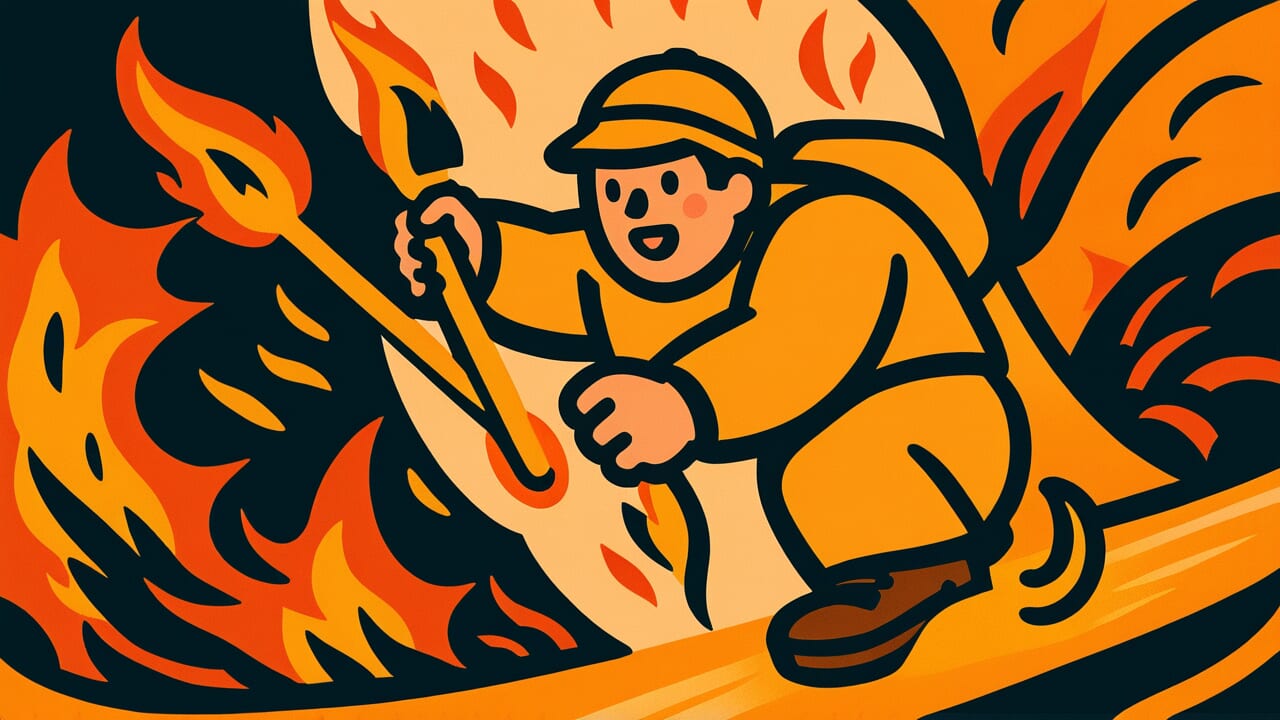How to Read “If you’re in a hurry, use high heat”
Isogaba takabi
Meaning of “If you’re in a hurry, use high heat”
“If you’re in a hurry, use high heat” is a proverb that warns against using high heat when you’re in a hurry. It teaches that rushing leads to failure.
When you cook too quickly on high heat, food burns or falls apart. Similarly, hasty actions in life often lead to mistakes you could have avoided.
This proverb applies when deadlines approach or you want quick results. It reminds you to stay calm and choose the right method, even when time is short.
Panic dulls your judgment and causes errors you would normally prevent. The cooking metaphor makes this lesson easy to understand and remember.
Even today, when you feel rushed to make quick decisions, these words give you courage to pause and think carefully.
Origin and Etymology
No clear written records exist about the origin of “If you’re in a hurry, use high heat.” However, this proverb likely came from cooking wisdom.
In traditional Japanese cooking, especially simmered dishes and rice, heat control was one of the most important skills.
Using high heat to finish cooking quickly burns the outside while leaving the inside raw. It also causes food to fall apart. Rice cooked too quickly on high heat stays hard in the center or burns.
People in old Japan used wood or charcoal for fire. Controlling heat was harder and more important than today.
Apprentice cooks learned to “read the fire” as a basic skill. When rushing, careful heat control became even more essential.
This cooking lesson gradually spread as general life wisdom. The warning against rushing came from the kitchen, a place everyone knew.
It then took root deeply in people’s daily lives. This proverb shows how keenly our ancestors observed truth in everyday activities.
Interesting Facts
In cooking, there’s a saying about rice: “Start gentle, middle strong, never lift the lid even if baby cries.” This also teaches the importance of heat control.
The secret to delicious rice is gradual heat changes: low heat first, high heat in the middle, then steaming at the end.
Edo period cookbooks contain detailed descriptions of heat control for simmered dishes. Cooks back then had advanced skills to adjust heat based on ingredients, size, and pot material.
This delicate heat control technique supports the depth and sophistication of Japanese cuisine.
Usage Examples
- Staying up all night to finish your presentation because you’re out of time is “if you’re in a hurry, use high heat” – your brain won’t work during tomorrow’s actual presentation
- Rather than cramming the night before an exam, “if you’re in a hurry, use high heat” reminds us that studying a little each day actually helps you learn faster in the end
Universal Wisdom
“If you’re in a hurry, use high heat” contains deep insight into the human emotion of panic. Why do people choose methods that lead to failure when they’re rushing?
Panic narrows our vision. When pressed for time, we focus only on “speed” and lose sight of “reliability” and “quality.”
We fall into simplistic thinking: high heat will cook faster. Then we burn the food. This pattern repeats in every area of life, not just cooking.
Our ancestors understood this human weakness well. That’s why they taught this lesson through everyday cooking.
They left it as wisdom anyone could learn in the kitchen, not in advanced philosophy books.
This proverb has survived because panic is a timeless human trait. Ancient people and modern people alike face deadlines, rush for results, and fail in the same ways.
Technology advances, but the psychology of panic clouding judgment never changes. That’s why these words still resonate with us today.
When AI Hears This
When you use high heat in cooking, a physics phenomenon called “dissipative structure” actually occurs. This is Prigogine’s theory, which won the Nobel Prize in 1977.
Simply put, it means “when you pour in lots of energy, instead of falling apart, things create orderly structures.”
When grilling meat, gentle heat keeps the surface around 100°C. But high heat exceeds 200°C. In this high-temperature environment, the Maillard reaction between amino acids and sugars progresses rapidly.
This reaction speed doubles for every 10°C increase. So 200°C proceeds over 100 times faster than 100°C. High heat doesn’t just “heat faster” – it reaches a chemical reaction zone that gentle heat can never achieve.
Dissipative structure theory is interesting because the more energy you add, the further the system moves from equilibrium, making new structures easier to form.
Slow heating with gentle heat just gradually hardens protein. But rapid heating with high heat creates complex structure: fragrant, browned surface with juicy interior.
This perfectly demonstrates the dissipative structure principle: “concentrated energy input creates higher-order organization.” When rushing, a burst of high energy produces qualitatively different results than moderate energy.
Lessons for Today
“If you’re in a hurry, use high heat” teaches modern people the importance of having courage to pause, especially in an age that prioritizes speed.
Modern society is dominated by values of “faster and more efficient.” Instant replies, quick results, speed-focused evaluation. We live constantly feeling rushed.
But this proverb gently asks: Is that really the best way?
When you feel panic, it might be a sign to stop. Take a deep breath and check your current state. Do you really need to rush? Is there a more reliable method?
Give yourself time to think calmly and reconsider.
If something is chasing you now, remember this: If you burn it with high heat, you’ll have to start over from the beginning.
Working carefully with proper heat control finishes faster and more beautifully in the end. Have the strength to keep your own pace without losing to panic.
That is what truly “hurrying” means.



Comments